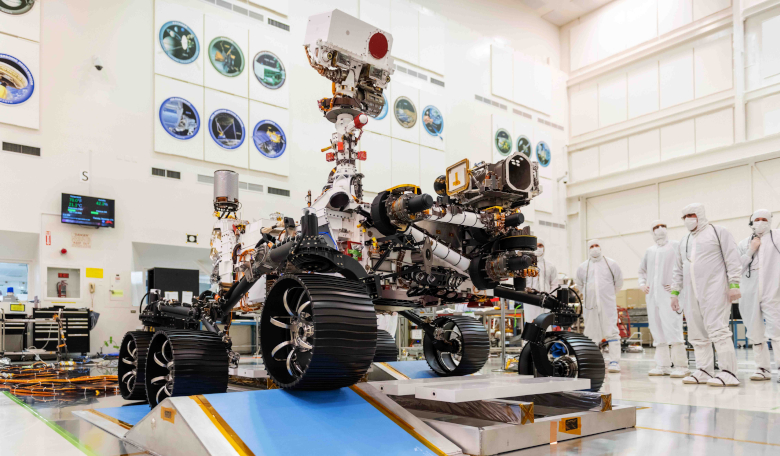Parachuting to the surface of the red planet with an all-new navigation system — and, for the first time, cameras to record the plunge — the six-wheeled rover’s entry, descent and landing apparatus scans the terrain, comparing images with ones already gathered by orbiting satellites, and calculates the odds of a safe landing as the rocket-powered descent stage takes over.
Engines fire in the final seconds, slowing the descent until Perseverance hovers above the surface of Jezero Crater, a 3.5- to 4-billion-year-old landscape that was part of an ancient delta. Motors on the descent stage lower the SUV-sized rover the last few metres by cable, elevator-style, gently setting down the robotic explorer on its legs and wheels the same way the rover Curiosity landed.
At any rate, that’s the plan for landing NASA’s newest rover, this one destined to analyse Mars’ rocks and dirt for signs of ancient life after arriving there in February 2021.
NASA scientists and officials answered reporters’ questions about the mission in a virtual briefing on 17 June explaining that while Perseverance’s science instruments will analyze samples on site, proving that the conditions for life existed probably won’t happen there.
“Very likely, we’ll have to return those samples to Earth to make that definitive conclusion,” said Katie Stack Morgan, Perseverance deputy project scientist at the NASA-funded Jet Propulsion Laboratory (JPL) in California where the rover was built.
When is the launch of Perseverance?
NASA plans to launch Perseverance in a month’s time on 20 July from Cape Canaveral Air Force Station in Florida on the first day of the launch window that stretches to 11 August and potentially as late as 15 August.
Soon, the workers there will encapsulate the rover, already sheltered in its own aeroshell, within the two halves of the Atlas 5 rocket fairing that the rover will launch inside, then lift the fairing assembly by crane to install it atop the rocket.
Instruments and devices onboard the rover include four to analyze the composition of Mars’ rocks and dust, one to try turning the carbon dioxide in Mars’ atmosphere into oxygen, a set of sensors to measure dust and wind, and a ground-penetrating radar. Riding along, stowed under Perseverance’s belly pan, will be the Mars helicopter Ingenuity.
Part of Perseverance’s mission is to collect samples to leave behind in caches that a future rover could collect for return to Earth.
“Any major perturbation” in the launch preparations could push back the launch date, said Omar Baez, launch director in NASA’s Launch Services Program in Florida, but the three-week launch window provides some reassurance.
“It’ll be interesting to watch as China attempts this as well,” said Lori Glaze, director of NASA’s Planetary Science Division.
China’s Tianwen-1 mission this summer includes a rover, while the United Arab Emirates is preparing to launch its Hope probe from Japan. The European Space Agency delayed its ExoMars mission until 2022.
NASA chose the name Perseverance after receiving 28,000 entries from children, while 11 million people wrote in to have their names etched on a silicon chip going to Mars onboard the rover.
If you've enjoyed reading this article, please consider subscribing to ROOM Space Journal to gain immediate and full access to the latest magazine feature articles and receive your own print and/or digital copies of the quarterly ROOM magazine delivered electronically or direct to your door.











